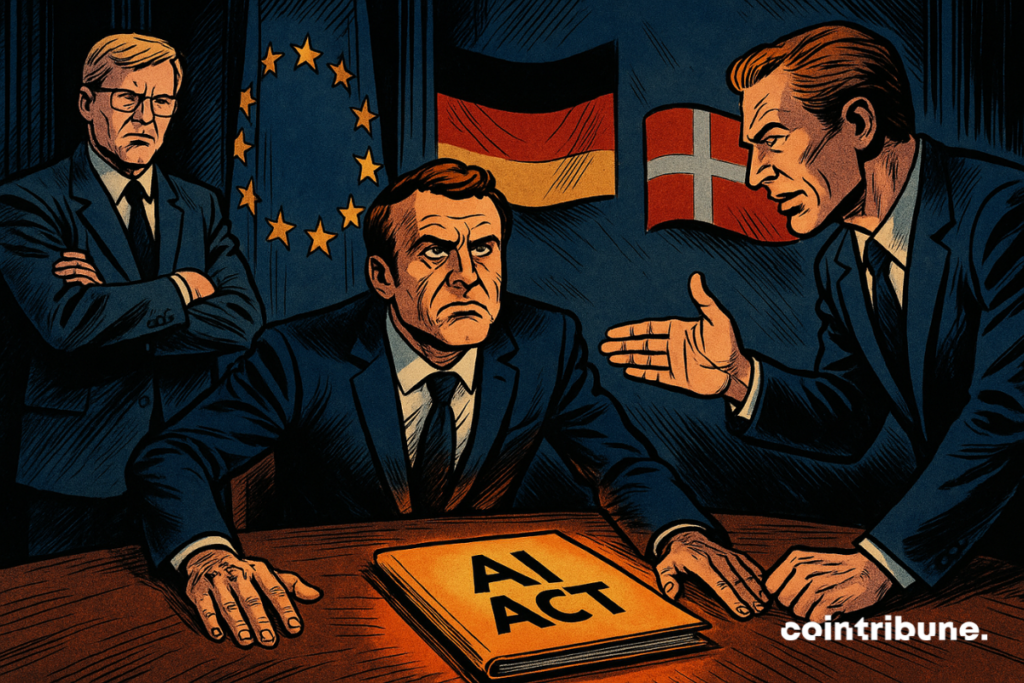EU divided on AI Act: Paris and Berlin call for postponement
In Europe, the pendulum seems to hesitate: innovate or regulate, let go or legislate? Artificial intelligence (AI) crystallizes tensions. While some voices call for a solid ethical framework, others denounce a suffocating straitjacket. Should we slow down to progress better? In Brussels, the lines are moving, ministers argue, lobbies are active. Behind polished speeches, a truth emerges: Europe is still seeking its path between digital sovereignty and economic pragmatism.

In brief
- Paris and Berlin want to postpone by one year the obligations for so-called high-risk AI.
- Several MEPs fear a maneuver favorable to well-established tech giants.
- Europe struggles to compete with massive investments from the United States and China.
- NGOs denounce a digital deregulation threatening users’ rights and transparency.
AI in Europe: when regulation slows down or frees innovation
In Berlin, during the summit on digital sovereignty, France and Germany called for a 12-month postponement of the strictest AI Act rules on high-risk artificial intelligence systems. Emmanuel Macron emphasized: “
On the AI Act, we are requesting a 12-month postponement for the compliance of high-risk AI systems. It is also necessary to take advantage of this time to accelerate our innovation agenda.
In response, Anne Le Hénanff, French Minister of Digital Affairs, specified that “the AI Act now contains too many uncertainties.” The persistent uncertainties slow down the innovation momentum… while the United States and China widen the gap.
Some members of the European Parliament denounce this proposal. They see it as a threat to the Union’s credibility, an opening to the influence of GAFAM, always eager to exploit regulatory gray areas.
But behind this political tug of war, the issue is clear: should we secure first or let AI breathe to exist? The debate crosses the ranks of young tech startups, notably in the blockchain ecosystem, which are waiting for clear legislation to develop without fearing regulatory backlashes at every parliamentary initiative.
EU, digital sovereignty and AI in the global race
The issue goes far beyond mere regulatory compliance. It is about digital sovereignty, an obsession for European capitals. In Berlin, Macron hammered:
Europe does not want to be the client of big entrepreneurs or big solutions coming from the United States or China. We clearly want to design our own solutions.
Behind this “European preference“,” one reads the concern: 90% of German companies dependent on digital technology say they are vulnerable to American and Asian dominance. The Bitkom report shows a glaring delay: Europe caps at 16 gigawatts of power in its data centers, compared to 48 GW in the United States and 38 GW in China.
Karsten Wildberger, German Minister of Digitization, advocates for a framework that “evolves over time”. For him, it is better to test, correct, then regulate: “Let’s build the products first, then seriously examine their operation, their safety, and the right processes to implement“.
And at the heart of the debate, artificial intelligence is not alone: crypto-assets, Web3, and decentralized identities are also awaiting their time in a less restrictive and more competitive framework.
The AI Act as a revealing of a dilemma: standards, innovation, and law
What is at stake with the AI Act is also a test of legal maturity for Europe. The Commission proposes to review the texts, to delay mandatory labeling of AI-generated content until 2027, to relax obligations for SMEs. This desire for “digital simplification” could open the famous “Pandora’s box” feared by some MEPs.
NGOs are raising the alarm. An open letter signed by several associations warns: the planned legislative changes go far beyond mere simplification. They deregulate fundamental pillars of GDPR and the AI Act.
But supporters of the postponement evoke a digital future under construction. For them, excessive caution could make European AI as slow as ineffective. The tension is palpable, including on X (formerly Twitter), where figures from the tech ecosystem call for a “smart moratorium” – a strategic pause, not an abdication.
Hot points to watch in the AI debate
- December 2027: new expected date to apply high-risk AI standards;
- 12 billion euros of digital investments promised by European companies according to Friedrich Merz;
- 48 GW vs. 16 GW: data center power US vs. EU;
- Pandora: name given by NGOs to the GDPR and AI Act reform;
- Brussels, Copenhagen, and Berlin: three capitals united to delay sanctions until August 2027.
As the debate intensifies, another promise arises: that of the digital euro. The ECB presents it as a lever to stabilize and strengthen the European economy. Maybe the best proof that on this old continent, the search for balance between control, trust, and competitiveness continues.
Maximize your Cointribune experience with our "Read to Earn" program! For every article you read, earn points and access exclusive rewards. Sign up now and start earning benefits.
La révolution blockchain et crypto est en marche ! Et le jour où les impacts se feront ressentir sur l’économie la plus vulnérable de ce Monde, contre toute espérance, je dirai que j’y étais pour quelque chose
The views, thoughts, and opinions expressed in this article belong solely to the author, and should not be taken as investment advice. Do your own research before taking any investment decisions.